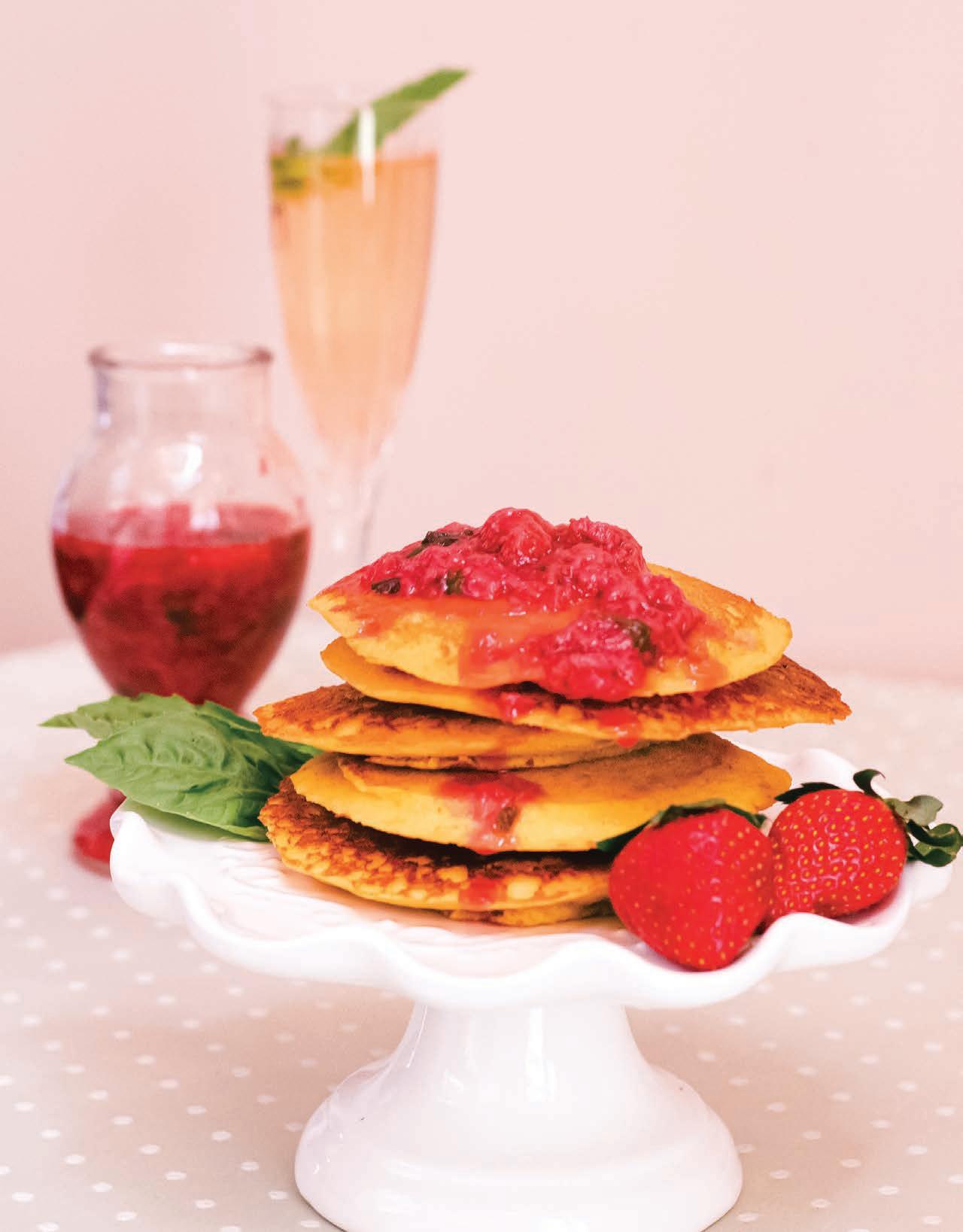

We speak home advantage.
FLEXIBLE SPENDING WITH HOME EQUITY LINE OF CREDIT

If you’re a homeowner looking for some extra spending power, your winning team is ValleyStar and your very own home-sweet-home. With our low rate Home Equity Line of Credit (HELOC), it’s easy to transfer funds to other ValleyStar accounts, you can consolidate debt if necessary, and rather than paying back a full amount like you would for a loan, a line of credit just gets you what you need, when you need it. Let our local mortgage experts help you make that goal! Just snap the QR code to visit us online at valleystar.org/personal/borrow/home-equity-loans/.

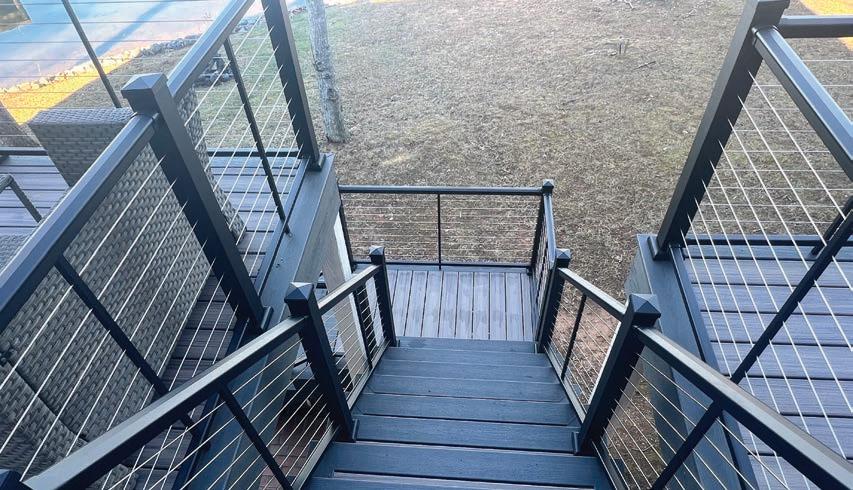

















EXPERIENCE THE DIFFERENCE


DESIGN BUILD MAINTAIN
540.489.3715

30 DAY RISK FREE TRIAL
When we say we want you to be happy, we mean it. We guarantee your total satisfaction with your purchase. If, within 30 days, you are not completely happy, we will exchange it or provide a full refund with no restocking fee.
LO WE ST PRICE GUARANTEE
We guarantee that nobody will beat Grand’s prices. If you find an identical item in stock at any other retail store in our trading area (100 mile radius) for less than our price, and if it’s within 30 days of your purchase, we will happily refund 110% of the difference.
FREE MATTRESS & LIFT CHAIR DELIVERY
Grand provides free delivery on mattress sets $697 or more and lift chairs $999 or more. We will remove your old mattress and as a bonus, any furniture bought the same day is delivered along with your mattress set or lift chair for free.
CONVENIENT FINANCING OPTIONS
If paying over time makes you happy, we will gladly finance your purchase. From a Grand Credit Card, to low monthly payment plans, to layaway, we have options for great and not so perfect credit.



















 BY GINNY SMITH
JERRY HALE
BY MARTHA COFFEY
AMELIA POORE
BECKY CALVERT
BY SARAH NICHOLAS
BY KATHERINE FULGHUM KNOPF
BY GINNY SMITH
JERRY HALE
BY MARTHA COFFEY
AMELIA POORE
BECKY CALVERT
BY SARAH NICHOLAS
BY KATHERINE FULGHUM KNOPF








Ahh, we’ve turned the corner and arrived at the spring of 2023. Signs are everywhere: trees flowering, spring bulbs blooming, birds singing. Aren’t we fortunate to live in this region that affords us the pleasure of four seasons!
April in Virginia always brings the anticipation of Historic Garden Week, and this year’s tour includes homes and gardens in Roanoke sure to inspire and excite. Read more about the details of the tour and the homes participating this year. While you’re thinking outside, make a plan to attract hummingbirds, butterflies and songbirds to your garden. Discover what plants you’ll need to entice these visitors. As well as outside in the garden, HOME also takes a peek at the Garden Room — inviting the outdoors in with light filled, three-season living.


First and foremost is the entrance to your home. Is it time for a revamp? We have the latest designs and embellishments to make your entry absolutely enchanting. Kitchen upgrades are always a great idea, but what to upgrade? New colors, new countertops, artwork and appliances will transform your galley from sedate to great! Local professionals share tips and ideas to help make your upgrades seamless.
Once your kitchen is ready to go and your garden is open for the season, thoughts turn to entertaining. Sarah Nicholas proposes “A Better Brunch” with emphasis on fresh produce
and refreshing beverages. What could be better than strolling through the garden and having brunch with family and friends?
Spring offers so much in the way of renewal, color and the warmth of a sunny day. The change of season is always welcome. Whether you delight in tiptoeing through the tulips or tipping over another wheelbarrow full of mulch, we hope you’ll take time out to read through this issue of HOME. Happy Spring, Roanoke Valley!
As always, thank you for reading.
Anne Marie Poore | annemarie@jamesrivermedia.com

More than a retail store, The French Farmhouse instills the value of community and creates memorable experiences for each person walking through our doors.

We help you find home decor that invites joy, that tells the story of you, your past, your values and turns a house into a HOME More than a casual shopping encounter, A DESTINATION.
VOLUME 1 6 ISSUE 2
HOME Spring into Swimming!


ART DIRECTOR EDITOR
Anne Marie Poore
CONTRIBUTING WRITERS
Shelley Basinger
Becky Calvert
Martha Coffey
Jerry Hale
Katherine Fulghum Knopf
Margie Lippard
Kendall Atkins Livick
Noelle Milam
Sarah Nicholas
Amelia Poore
Ginny Smith
PHOTOGRAPHER
Kathryn Feldmann
GRAPHIC DESIGNER
Donna Collins
ADVERTISING SALES


Kirsten Morey Becker
Julia Belvin
Lisa Bowers
Joe Katany
Anne Marie Poore
Kenny Shelton
SUBSCRIPTIONS
Roanoke Valley HOME is published five times annually by James River Media, LLC. For an annual subscription, please send $20 and your name, address and telephone number to: Roanoke Valley HOME
109B Tradewynd Drive, Lynchburg, VA 24502
For advertising information please call (434) 845-5463 or email HOME@jamesrivermedia.com
To discuss coverage of an event relating to home or garden, please contact Roanoke Valley HOME at HOME@jamesrivermedia.com
JAMES RIVER MEDIA, LLC
(434) 845-5463
Copyright 2023 by James River Media, LLC. All rights reserved. No part of this publication may be reproduced or transmitted in any form or by any means without written permission from James River Media, LLC. All pictorial material reproduced in this magazine, whether in a produced ad or by itself, has been accepted on the condition that it is with the knowledge and prior consent of the photographer or the artist concerned. As such, James River Media, LLC is not responsible for any infringement of copyright or otherwise arising out of publication thereof. The information contained herein has been obtained from sources believed to be reliable. However, James River Media, LLC makes no warrant to the accuracy or reliability of this information. Opinions expressed in this magazine are those of the authors and do not necessarily reflect the opinions of ownership or management.
































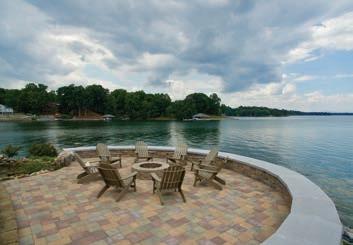




ANIMAL
attraction
Create a garden that makes your favorite pollinators feel at home
BY SHELLEY BASINGERNo matter how old I get or the level of gardening experience I accumulate, whenever I see a butterfly come in for a landing or a hummingbird zip in for a snack, I feel the rush of excitement I experienced as a child. I hold my breath — craning my neck at attention — as I watch a small scene unfold.

Of course, we build our gardens to look beautiful, carefully selecting colors and textures that create a visually appealing landscape. However, also consider the wonderful pollinator friends your plants and flowers may entice, such as hummingbirds, butterflies and bees.


Townside Gardens in Roanoke (located at 3614 Franklin Road SW) was founded in 1987; Casey Broughton and her mother purchased the business in 2020 after Broughton had worked there for five years. Broughton says some customers ask about plants to attract pollinators — but she doesn’t feel they get asked about this topic enough.
“We still get quite a few who come in to ask for flowers that ‘won’t attract bees.’ We understand that this is based on fear of being stung and lack of education about the behavior of bees,” Broughton said. “We have worked hard to educate our community about the importance of our pollinators.”
As Broughton explains, not only are pollinators essential to growing a beautiful garden, but they are also essential to the food chain.
“Roughly 75 percent of all known plant species depend on animal or insect pollinators. So, if you want your apple trees to grow apples, your vegetable garden to produce abundant veggies, or your holly trees to make pretty red berries in the winter, you need to care about pollinators,” Broughton said, citing a U.S. Department of Agriculture statistic that about 35 percent of the world’s food crops depend on animal pollinators to reproduce.
Bottom line: You can attract some of your favorite pollinator friends to your garden and contribute to a bigger cause at the same time. It’s a win-win!
If you’re ready to get started, here are a few of Broughton’s top tips for bringing pollinators to your garden:
Tip #1: Prioritize native plants


Native plants, defined as “local” plants that have been growing in an area for thousands of years, are best suited to providing high-quality food sources for pollinators.
“Many cultivars have been bred for the human eye. Often, along the way, qualities like nectar production and scent are selected against and lost in the process,” she explained.
So, should you only choose native plants? Not necessarily, Broughton noted.
“Ornamentals certainly have their place. Just be careful you are not planting something that will out compete your natives and become invasive,” she explained.
Tip #2: Must have water
A steady supply of fresh water ensures pollinators can drink, cool off and reproduce.
“If you don’t have a natural water source in your yard, you can use a small bird bath or shallow dish. Ensure that the water is not too deep and the sides are gently sloped with good grip,” Broughton said, explaining that bees are notorious for drowning in deep bird baths.
Be sure to keep your water source clean and free of algae, mold and pesticides.




Tip #3: Keep them coming back for more
Just like we will sometimes drive out of the way to go to “our” familiar grocery store, animals, birds and insects are also creatures of habit.
“If you want to create a sustainable home for your resident pollinators, they’ll need food sources (and fresh water) year round,” said Broughton.


That’s why it’s important to consider a layered approach with your garden, making sure to include a blend of plant materials, shrubs, perennials and annuals so that your garden has something to offer for pollinators at various times of the year.
“Perennials are nice because you don’t have to plant them year after year. Once planted, many perennials will spread and fill larger spaces, growing together and among shrubs and trees,” said Broughton. “The downside to perennials is their comparatively short bloom time. Most perennials bloom for about three to four weeks.”
Annuals, on the other hand, frequently bloom spring through early fall.
“They are an excellent food source for pollinators and are often brightly colored, attracting a wide variety of pollinators. They will, however, have to be replaced every year in the spring as they do not survive the winter,” Broughton explained.
Tip #4: Let it hang … or climb
Hanging baskets on your deck or porch is a way to draw pollinators to different areas around your home, giving them even more places to frequent.
Or, whether it’s on a fence or a pergola, consider adding vines to your outdoor
Wonderful patio home in sought after gated community. Conveniently located near all amenities. Flexible space to benefit comfortable multi-generational living. Entry level provides easy living, relaxation and entertainment opportunities with two en suite bedrooms including the primary; eat-in-kitchen, dining, family and living rooms, sun-room, laundry and half bath. The thoughtful plan continues with two upstairs bedrooms and full bath for children or guests plus an ample cedar closet. Downstairs offers an office/den, art/craft-room, large recreation and work/ multi-purpose rooms, half bath plus sun-room and abundant storage. A spacious balcony attached to the entry sun-room and a patio accessed from the basement provide outdoor enjoyment.
3325 Somercroft Ct., $699,999

JEANNINE HANSON, GRI, CRS, ASP REALTOR® 540-798-8640 • www.buyroanokehomes.com


landscapes — pollinators love them, especially jasmine and honeysuckle.

“Look at your space and evaluate the various heights, shapes, sizes and growth habits,” said Broughton. “You should have ground covers, shrubs, trees, vines, grasses, etc. This variety ensures an ecosystem in balance and provides ample opportunities for pollinators to forage, nest, reproduce and hibernate safely.”
Now, let’s get specific. Here are a few of Broughton’s pollinator-friendly recommendations. She chose this list based on how well they perform in this area and whether they are easy to find in local stores.

ASCLEPIAS (AKA: MILKWEED OR BUTTERFLY WEED)
Asclepias is an essential food source for monarch butterflies. Without butterfly weed, these butterflies would become extinct. Not only do the caterpillars eat the leaves of the plant, but they also pollinate the flowers and lay their eggs on the leaves. There are many species of asclepias. Most are perennials in our zone (such as asclepias tuberosa and asclepias incarnata). But there are some tropical varieties we grow here as annuals (such as asclepias curassavica). Asclepias is a summer/early fall bloomer.
SOLIDAGO SPECIOSA (AKA: GOLDENROD)
Goldenrod is a common native plant you see growing in fields in Virginia. This yellow flower attracts throngs of different pollinators and is an important nectar source for pollinators in the late summer and fall.

GOLDENROD

LOBELIA CARDINALIS (AKA: CARDINAL FLOWER)
This red, tube-shaped flower is popular with birds and butterflies. It depends on hummingbirds for pollination. Their long tongues can reach the nectar deep inside the flowers. The cardinal flower blooms in summer/fall.

BIGNONIA CAPREOLATA (AKA: CROSSVINE)
This vining plant produces orangey-red blooms that are an excellent early season nectar source for butterflies and hummingbirds.
OXYDENDRUM ARBOREUM
(AKA: SOURWOOD TREE)
This relatively large native tree flowers in the summer and provides a good nectar source for native bees.
AMELANCHIER (AKA: SERVICEBERRY)

Serviceberry is a good choice aesthetically due to the yearround interest it provides. In the spring, they produce white flowers. The flowers give way to small edible purple fruits in the summer. Serviceberry also puts on a good show in the fall with yellow-to-red fall foliage. Serviceberry is a good choice for pollinators because it’s one of the earliest spring bloomers, providing nectar and pollen.
Enjoy the lovely blooms of this wide variety of flora, and your birds and bees will happily keep our ecosystem healthier for us all. ✦
Awelcomewarm
Porches and entryways bringing the old and new

 BY KENDALL ATKINS LIVICK
BY KENDALL ATKINS LIVICK
Your entryway is the drumroll to the experience of your home. It can be dingy and underwhelming at worst or hospitable and awe-inspiring at best.
My Nana used to fling open the door with a twinkle in her eye and say, “Come in this house.” It was a lovely and cozy home, filled with aromas of delicious foods and warm hugs. Little did I know then that my husband and I would one day own and bring our babies home to this same house.
After living there for a few months or so, a few of our neighbors came in one day and said, “Wow, I wasn’t expecting such a decorative and lively house inside.” I soon came to realize I’d focused a lot of attention on the inside, while mostly ignoring the front porch and entryway.
Entryway trends of the moment can best be summed up as traditional with a nostalgic nod to whimsical embellishments. The last few years have led to a renaissance of all things that make us want to lean into warm memories of the places we’ve felt the most loved.
Front porch sittin’
In terms of front porches, traditional symmetry is as popular as ever. Think hanging or potted plants, lanterns, sconces, rocking chairs and window boxes. Layering in organic natural materials like outdoor fringe, jute, wicker and wood add depth and personality in rugs, furniture, textiles, pillows, cushions and throws. Circular and rounded shapes are highlighted in the form of egg-shaped chairs, swings, rounded rugs, tea tables and
spherically trimmed boxwood shrubbery. Create pops of color with flowers, floral and checkered print patterns and painted doors.


While the thinking of the prior minimalistic era was “less is more,” these days, “more is more.” If you enjoy plants, don’t stop at hedges. Fill the space with overflowing terracotta and ceramic pots to not only frame the doorway, but also line the porch steps on both sides. Fill window boxes with cascading blooms. Even the smallest of stoops can be personalized with a cheerful welcome mat, lantern and baby bonsai by the door. Don’t skimp on the topiary. The more precisely curved, zig-zagged, or rounded the trimming, the more eye-catching.
In terms of color, for both porches and foyers — black and white contrasts, gold accents, both neutral and moody shades


Pick a Certified Contractor and Enjoy Peace of Mind








We specialize in the professional installation of windows, doors, gutters, siding and roofing to fit every need and style.
We feature Pella and Andersen replacement windows. Our window installations go the extra mile to preserve your home’s authentic details. A great window is only as good as its installation, so why trust your installation to an uncertified contractor or worse yet, an uncertified, unlicensed and uninsured installer. Elegant Exteriors installs its windows and doors with its own employees, not subcontractors or piece workers. Elegant Exteriors by TBS, LLC is a Trex Pro as well an Andersen and Pella certified contractor which means that all of our installations come with a 2-year labor warranty.


in monochromatic styles and the rich browns of artistically crafted wood — are thrilling to the eye. Statement marble remains a luxurious feature in foundational furniture and flooring. In terms of accent colors, we can’t forget the color of the year, Pantone’s Viva Magenta. That and related hues like mauve, dusty rose and lavender are showing up as statement doors and built-in features.
Crossing the threshold
You might be wondering, if everything is symmetrical and traditional, then what’s new? Nostalgia is definitely reigning over novelty, and yet novelty is achieved in the eclectic pairing of embellishments.


Leaning further into the biophilic aspects of the home can create a seamless transition from the outdoors in. If you’ve included plants for the ambiance of your porch, consider continuing the theme with a mini tree by the door, a few snake plants or some fresh-cut flowers in an ornate glass vase in the foyer.
Another form of continuity can be seen in the form of a monochromatic color palette in which the walls match with any molding, trim, millwork, art and accessories.

There’s a reason why traditional entryway layouts include a pendant light or chandelier, side table with a mirror and a plant off to the side, typically parallel to a runner that defines the walkway from the front door. Foyers and mudrooms tend to be narrow nooks in the home, and this cohesive layout is what we’ve come to expect.
However, this doesn’t mean we can’t push the limits or create a whole new vibe. If you prefer contrast to cohesion, you can define your foyer as a completely separate area off the beaten path from the porch and the rest of the house.
Get creative
Bring in novelty with accent lighting, such as sconces with colorful shades. Vintage pendant lights, along with backlighting on mirrors, art and encased archways can create visual drama. Statement ceilings painted an accent color or adorned with wallpaper can train the eye to take in the full scale of the room.
Built-ins such as sophisticated cubbies and elaborate custom cabinetry complete with hooks and pegs can add practicality in mudrooms and foyers. Families can reduce clutter by designating this drop zone for shoes, coats, bags, mail and other odds and ends. Additionally, cushioned window seats with pillows can provide comfort and sneaky storage with sliding doors or baskets to keep eyesores hidden.
Honorable mentions for expressive whimsy include tassels, fringe, trim, ruffles, stained and fluted glass, scalloped edges and wallpaper accents. Gallery walls add personality by depicting family, friends and pets.


As for my family, it was a bittersweet day when we outgrew Nana’s nostalgic house and moved out. Again, I waited until last to decorate the entryway, but this time it was intentional. After considering the rest of the house, I wanted to curate a showstopping entryway with a drumroll to the tune of welcoming my loved ones.
The front porch or entryway can really roll out the red carpet for the rest of the house. Why not include a full orchestra, with trumpets, fluting and all the other enthusiastic touches that say to your guests with a twinkle of the eye, “Come in this house.” ✦

IS YOUR KITCHEN KEEPING UP?
Design trends for the most common upgrades
 BY MITZI BIBLE
BY MITZI BIBLE
Our kitchens see a lot of activity every day: Besides cooking and baking, there are school projects, coffee visits with neighbors, family game nights, working remotely and the constant coming and going of little hands snatching snacks. Kitchens are truly the hub of our homes, and for that reason, they see more upgrades than perhaps any other room.
Whether you opt for a subtle hardware switch-up, a cabinet facelift or new appliances to bring your kitchen into the 21st century, you’ll find today’s trends reflect both style and function.

Cabinetry
When most homeowners start thinking about upgrading their kitchens, cabinets are at the top of the list. Simplistic designs seem to be taking over, with many people choosing painted cabinets, shaker style, with less interest in the natural wood cabinets of the past.

The National Kitchen + Bath Association’s (NKBA) 2023 Design Trends report states that bold colors are gaining ground. The designers surveyed said they are seeing a rise in richer colors, mainly blues and greens, while white/off-white is still expected to remain the most popular neutral color.
Kenneth Potter, owner of Potter Construction, which services the Roanoke Valley and Smith Mountain Lake communities, said a majority of his customers are choosing white and off-white cabinets. He said so far there has not been a resurgence of the natural wood cabinets — the oaks and cherries — though some customers have chosen to give their cabinets a facelift with a translucent wash.
“White cabinets are like the polished chrome bathroom fixture, they might not be the most popular, but they’re never considered out of style either; they’re always a safe bet.”
Potter said when customers do request new colors for cabinetry, it’s usually the neutral gray or beige, or they may do the perimeter in white but ask for the island to be painted
with a light color, like a gray wash, making it the focal point of the kitchen.
Though he said the national trends haven’t taken hold yet in our area, he has guided some customers who were curious if bolder colors would work in their kitchens. When a customer asked for a dark blue island in an all-white kitchen, for example, he used computer rendering software to help them visualize the change. In that particular case, the customers decided that they definitely didn’t want to go that bold.
“What you’re seeing in your mind may not be the same thing,” he said.
But if you think you may be ready to ride the new waves of kitchen design, consider deep jewel tones, like turquoise and dark blues and greens. Some designers recommend black, which, when paired with lighter wood countertops or wood flooring can bring an earthy, organic feel to the room. Designers will tell you that black is still a neutral, and it’s a fact that darker, deeper colors will certainly hide more dirt. Anyone with white cabinets knows what a chore it is to keep them clean, especially for a young family or an avid cook.
The NKBA states even areas like coffee bars — a trend in recent years — are being upgraded with new colors. Again, greens, blues and mixed wood grains bring a pop of color to a neutral kitchen.


In appliances, stainless steel is dominating, but black stainless is making its move. The black stainless is a traditional stainless but with a protective polymer coating that creates a black matte finish.

If you’re looking for other ideas to keep your kitchen neutral but add some bursts of color, try switching up your décor, selecting colorful table linens, dinnerware, artwork or even mixing in colorful patterns in a tile backsplash.
Storage
Countertop cooking appliances span a wider range today than ever before. If you’ve joined the craze in air fryers, electric pressure cookers, espresso machines and countertop ice makers, you know how handy they are to have around but also how they can start to clutter your kitchen.
According to the NKBA, more homeowners are preferring kitchens with an open look and feel with features to hide clutter. Some creative solutions for tucking away smaller appliances and kitchen gadgets are decorative counter boxes (larger versions of bread boxes) and appliance garages (yes, that’s a real term for under-cabinet cubbies). In existing cabinets, some are choosing to box in the area between the upper cabinet and counter and install rolltop doors to create an appliance hideaway, fashioned after the old rolltop desk.



Other storage ideas for making your cookware more accessible include installing roll-out drawers in the lower cabinets and special roll-out racks for pot lids and spices. You don’t have to get on your hands and knees and dig to the back of the cabinet anymore!

Some easy upgrades you can do yourself are inserting shelf risers in your cabinets and open shelves on your walls.



Backsplashes

Another idea to update the style of your kitchen without doing a major overhaul is changing the backsplash. White subway tile has taken kitchens by storm, mainly because it can go with whatever colors you use throughout your kitchen. However, durability is still key — you want a wipe-away surface for all those grease and water splashes. Potter said tile backsplashes are trending toward larger, narrower tiles. “Subway tiles have evolved into the more updated version 3x12 instead of 3x6; it’s the same way with bathroom tiles, going to a 12x24 for showers.”


Care to Meet Your Needs l
We offer award-winning assisted living and enhanced memory care. Ask about rare openings in our most popular studio apartments!



Call Erin McKeon today.


Recovering from a surgery or illness? Enjoy a comfortable stay in our private rooms with on-site therapy and additional skilled nursing services. Contact Susan Thomas.


In countertops, the traditional granite has given way to more quartz or quartzite, in white and more natural tones, Potter said. (See our article on countertops on page 37.)


Washing up
Other popular upgrades involve installing larger sinks (especially useful for cleaning large pots and pans) and handsfree faucets. Potter said he’s seeing a rise in large, single-basin sinks in a mix of styles, from stainless and porcelain, with apron fronts. Touchless faucets can either be equipped with smart sensors or turned on with the touch of an arm, proving useful when both of your hands are messy. The touchless faucets keep germs from spreading but also conserve water. Most of today’s models come with a pull-down sprayer.
Lighting
Potter said one way to make a dramatic change in your kitchen is to add new lighting, especially recessed lighting. “People are using smaller recessed lights that still provide more light than the older ones, and they can make a huge difference in your design.”

Cooktops
Decorative range hoods are becoming a statement piece in kitchens, even with induction cooktops. “We’re doing more of those jobs with nicer range hoods, rather than the simpler cabinetry,” Potter said. If your cabinets are painted, a wood range hood can be a way to bring in a burst of natural wood tone without it dominating your kitchen design.
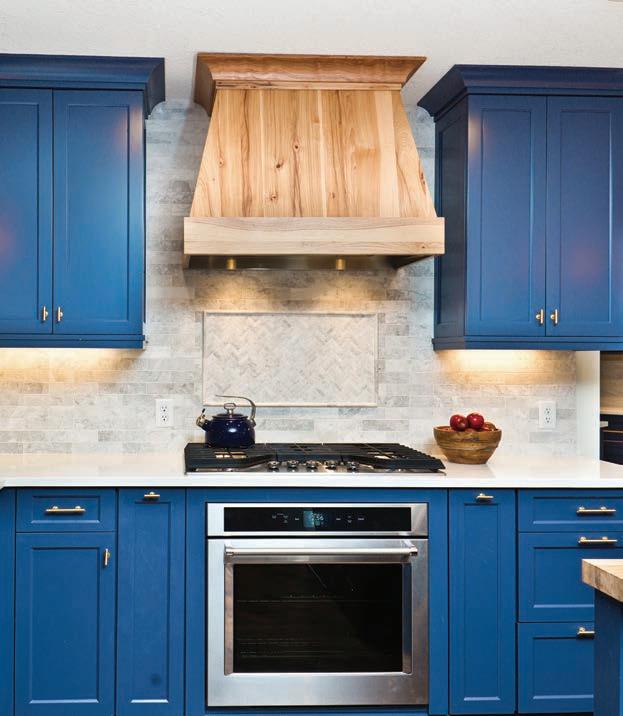
Perspective

It’s hard to know how many upgrades it will take to bring your kitchen up to speed and meet all of your needs. Sometimes it’s more than just choosing to upgrade your appliances. Once you start to make changes, there’s a strong likelihood you’ll want to make more, so consider going after your project with a “whole room” perspective.
And with so much of our time spent in the kitchen, it’s still important to maintain some of your own style, no matter what the design trend reports show. Trends will come and go, and what the industry says is “in” may not match your family’s style in feel and functionality.
“In kitchen design trends, our area may still be several years behind some parts of the country — and sometimes that’s not bad,” Potter said. “Our area has a more traditional, conservative take on things, but sometimes it’s better to avoid doing the trendy thing because it may go back out of style a few years later.”
The countertop Challenge
Choosing the right option for your space
BY GINNY SMITHWith so many beautiful options available for countertops, choosing which one is right for your space can be challenging. Whether you select a natural stone like a granite or marble or a man-made option such as quartz, asking yourself four simple questions can lead you to the right countertop to use as the focal point for your kitchen:

How much wear and tear will my countertops get?
What is my budget?
How much effort do I want to put into maintenance?
What is my style?
Once you answer these questions, you’ll be able to navigate the many options available.
Picture
Function
Our kitchens are busy places where guests tend to gather and where we spend much of our time. Countertops can be the focal point that makes our kitchens pop or they can blend into our cabinets, allowing paint and backsplashes to become the show stoppers.
Most importantly, though, we must evaluate how our countertops will be used in order to estimate normal wear and tear. According to Jennifer Slate, marketing director at Johnson Granite, a family-owned business for more than 20 years, “Our clients usually have an idea of what they want or, more often, what they don’t want. We listen closely and work together to pick the right materials and to give our clients a great experience.”



Kitchen counters need to go the distance. They are used for chopping, cutting, resting hot pots and pans and storing appliances, while also serving as landing stations for groceries and other household items. As a result, the durability of the material should be considered. Natural stone such as granite, marble and quartzite are popular choices for countertops. They are hard, dense, durable surfaces that resist scratching and are more tolerant of heat than man-made stone.
While some materials are slightly more durable than others, no countertop is indestructible. All are susceptible to chips, scratches and cracks. “The best advice is to follow manufacturers’ directions on any

man-made surface you wish to use and to seek guidance from the Natural Stone Institute to learn the facts about how your chosen material can be used,” comments Slate. “When accidents do happen, most materials can be repaired by a trained professional without requiring replacement of the countertop.”
Quartz, a man-made stone, is created with natural stone and a polymer resin. A workhorse in the kitchen, quartz is long-lasting, easy to clean and durable. “Quartz can stand up to some heavier use that might damage a softer granite or marble, but it’s not heat resistant,” says Slate. “You can’t put hot things on quartz. I’ve even seen damage from air fryers and other kitchen appliances.”
Budget
With a wide range of affordable options available, an updated look doesn’t have to break the bank. “There are very good options for your budget in each category of stone,” notes Slate. “Our job is to understand the look the client wants and to work within their budget to create their dream spaces.”

A quick overview of the cost of materials finds laminate and cultured marble among the most inexpensive materials available. The natural stones tend to be more expensive because of the quarrying and machining required to bring them to market. Quartz can be costly, but more affordable options are
often available. (See chart on page 40 for more comparisons.)
Mixing and matching materials is an option to put less strain on the budget. For instance, the outer countertops could be an entry-level natural stone while reserving the “wow factor” for an island created with a premium stone.

Maintenance
Natural stone, which is porous, needs periodic sealing to avoid penetration by liquids and smells. “Mother Nature is cranking out some beautiful material,” notes Slate. Even so, “it’s recommended that natural stone be sealed every six months to a year.” To determine readiness, she says, “drop a small amount of water on your countertop and come back about 15 minutes later. If it’s not bubbled up like water bubbles on a waxed car, it’s time to re-seal your countertops.”
Quartz and other man-made materials don’t need to be sealed.
Most countertops can be cleaned with a microfiber cloth and a mild cleanser, making sure any spills are wiped up right away to avoid staining. A paste of baking soda and water can

Natural Stone
Granite, marble, quartzite, limestone, soapstone, dolomite, onyx
PROS
• Unique veining and flow

• Hard, durable, dense
• Resistant to scratching
• More heat tolerant
• Can be used in outdoor settings
CONS
• Naturally porous; annual sealing is recommended
• Can be chipped, cracked or scratched by trauma
• Softer stones (i.e. marble, onyx)
• Heavy; hard to DIY
often remove stubborn stains; however, commercial-grade cleaning products specific to countertops are available. In fact, Johnson Granite has commercialgrade cleaning products available on the company’s website.

Personal style
Natural stone and man-made quartz are popular choices for those who want to upgrade their countertops and add value to their homes. Concrete and stainless steel are trending for those who crave a more industrial feel. A concrete appearance can even be created with a smooth, manmade material that mimics the look of concrete. Also, butcher block is another material that finds its way into kitchens for more of a farmhouse feel. With so many options available today, you should
be able to find materials and designs that satisfy your inner Joanna Gaines.

“Staying true to your style and avoiding trends is solid advice for any price-conscious homeowner,” notes Slate. “Classic white or black countertops will never go out of style, allowing you to change the look of a room more frequently for less expense.”
For the last several years, white and gray with heavy veining has been trending, but Slate reports, “now we’re bringing in more earth-tones like taupe and café au lait to add needed warmth.”
Personal style is the driving force in choosing a countertop design. Along with your individual taste, consider function, maintenance and a budget to help you choose the best option that solves your countertop challenge. ✦
Man-made Stone Quartz
PROS
• Imitates natural stone
• Easily repaired
• No annual maintenance
• Non-porous; food safe and anti-microbial
• Very durable & stain resistant
CONS
• Not heat resistant
• Usually more costly than natural stone
• Can be chipped, cracked or scratched by trauma
• Outdoor use is not recommended
• Heavy; hard to DIY
PROS
• Least expensive
• Easy maintenance
• Many colors available
• Lightweight; easy to DIY
CONS
• Easy to damage
• Difficult to repair damages
• Not heat/scratch resistant
• Will not add to a home's resale value
PROS
Laminate Butcher Block Concrete, steel, man-made concrete
• Can be less expensive if pre-fabricated
• Desirable farmhouse look
• Ability to cut directly on the surface without dulling knives
• Easy to DIY
CONS
• Easy to damage
• Requires frequent sealing to maintain food-safe finish
• Large variance in price and quality between pre-fabricated countertops and custom-made countertops

PROS
• Bold, modern look
• Easy maintenance
• Durable
CONS
• Specific style
• Varying price points
• Cracks, large chips difficult to repair














BRINGING THE LAKE EXPERIENCE INSIDE
The Fishers’ Weekend Home Renovation
Rob Fisher’s lakeside home was his family’s weekend stomping grounds for 20 years. But with his children all grown and grandbabies joining the family, their quirky spot needed a deep renovation to accommodate everyone.
Rob’s dream was to bring the lake experience inside. He chose Aspire to make that happen. “The house is amazing!” Rob said. His highlight is an open-riser staircase with 4-inch-solid white-oak treads, leading from the first to the second floor.

continued next page

Airy spaces. Graceful design. RENOVATIONS BY ASPIRE
The renovation and addition more than doubled the home’s size. Only a small portion was left in its original condition. “I had my whole family in it in October,” Rob said. “The house looked great.”
As the owner of Fisher Custom Homes and a builder for 25 years, Rob knew the importance of choosing the right contractor. From Aspire’s 3D-rendering software that made design easy to the thoughtfulness that even the neighbors appreciated, Aspire proved to be the “right” contractor. “Aspire has a high degree of professionalism and focus,” Rob says. “Their communication was excellent, as well as their flexibility. A real pleasure to work with.”
Aspire is a renovation company that serves the greater Roanoke, Salem, and Bedford areas, along with the Smith Mountain Lake community. Simple processes, attentive communication, and seasoned craftsmanship are their hallmarks. Aspire strives to bring the wonder and tranquility of nature into every space they touch.



THE
BIG CHILL
The cold, hard truth about refrigerators
 BY JERRY HALE
BY JERRY HALE
Thinking of replacing an aging refrigerator? Or choosing one for a new home build or kitchen remodel? With the kitchen typically the hub for the waking hours spent in a home, picking just the right chiller is key to how well a home works for its residents.
Refrigerators have recently evolved substantially from the once-standard freezer-on-top design. Side-by-side models came along to meet the demand for more eye-level shelves and easy access to chilled water and ice without opening a door, thus keeping refrigerated air inside the box. Typically between 33 and 36 inches wide, they offer up to a claimed 29 cubic feet of storage capacity. According to Consumer Reports, however, usable storage space for any fridge is usually 10 to 15 percent below what its manufacturer claims due to shelves, ice maker and other special components that take up inside space. And while a side-by-side’s narrow doors are a plus for smaller kitchens, the tall, slender compartments can make items that migrate to the back hard to find. And the doors can be just too narrow to satisfy some buyers.
What buyers want
“People are buying the largest refrigerators they can squeeze into their kitchens,” says Jeff Janney, owner of Vinton Appliance. “Models with a full-



width freezer drawer at the bottom are the rage, with the eye-level fresh-foods space behind a pair of French doors, each wide enough for pizza boxes and serving trays.”
One new innovation, he notes, is a “soft freeze“ drawer between the fresh foods section and freezer compartment. “Temperature there is individually
controlled — for keeping beverages and snacks a bit colder than the regular refrigerated space would. And opening it lets a minimum of chilled air escape.”

Janney also points to “fingerprintresistant” stainless steel finishes as a very popular innovation. This addresses the major complaint about original stainless steel, he explains, “...which seemed to need cleaning almost daily and required WD-40 or a similar product to get the job done. The newer stainless finishes go weeks between polishing.”
Other technology innovations include phone-controlled Wi-Fi connections, see-through door panels, in-door video screens — perhaps handy for accessing YouTube food prep videos — and “smart” fridges that purport to keep track of their contents, help prepare a shopping list and even place an order online. Hmmm ... that last one sounds like an invitation to set up frustrations and future repair bills, but perhaps a fun capability to brag about for those who value tech supremacy.
“We don’t push the really high-tech options due to servicing issues,” Janney cautions.
WITH

Built-in refrigerators
Made to fit flush with cabinets and counters, built-in refrigerators come in bottom-freezer, side-by-side and Frenchdoor styles. Pricey, they are usually tall (upward of 85 inches) and wide (up to 48 inches), with claimed capacities of 29 cubic feet and more. Some come ready for front panels that can make them seem to disappear into the kitchen cabinetry. Another built-in option is a column refrigerator, which forgoes a freezer compartment to maximize fresh-food storage and is typically paired with a matching freezer unit.
Buyers designing spacious gourmet kitchens may wish to consider commercial-grade Sub-Zero units—beginning around $7,000 in either their traditional stainless steel or “panel ready” option for the ultimate built-in look.

A refrigerator is a significant purchase these days, so it’s wise to shop around before taking the polar plunge. Consumer Reports offers a Refrigerator Buyer’s Guide that summarizes their independent test results. ✦
How to Keep your Fridge Clean
Use The Home Depot's tips for refrigerator spring cleaning.
STEP 1: Unplug the refrigerator, which saves energy while doors are open. If you are cleaning the freezer section, let walls warm while working on the fridge section.
STEP 2: Remove all food, putting most temperaturesensitive items into coolers with frozen foods as “ice.” Toss outdated leftovers.
STEP 3: Remove drawers and shelves; wash them with warm water and dish soap, rinse and dry.
STEP 4: Use a vacuum to suck up crumbs and other loose debris.
STEP 5: Use an all-purpose cleaner or cloth soaked in baking soda water to wipe down all inside surfaces. Baking soda paste will
loosen caked-on spills and tough stains.
STEP 6: Give surfaces a final wipe-down with baking soda water. Allow to dry. Wipe off top surface.
STEP 7: Replace shelves and drawers.
STEP 8: Plug in unit and place food back inside, reorganizing as needed.
STEP 9: Close doors, then clean and polish outside surfaces and handles.
Note that it is wise to periodically pull your refrigerator out of its niche, vacuum the floor underneath and any exposed coils. Be sure fridge is unplugged while cleaning coils, compressors and any exposed wiring.












Light-filled living
GARDEN ROOMS INVITE SPRING INSIDE
 BY MARGIE LIPPARD
BY MARGIE LIPPARD
Abounding with fresh greenery, flowering plants and warm sunlight, garden rooms beckon spring’s splendor inside. Distinct from a greenhouse, these idyllic rooms with a view are designed for cozy light-filled living. Whether an extension of your home or a repurposed posh shed, a garden room enhances your home’s décor yet boasts unique features that usher nature indoors: glass windows, natural building materials like stone and wood, rustic furniture and plants galore. A versatile oasis, it expands your floor space and serves myriad purposes, from a sylvan home office and gym to a charming guest bedroom or dining nook. Whatever its function, your garden room will provide a relaxing retreat where you can escape from life’s daily stresses and let your creativity soar.



A happy place
Garden rooms are trending in home design. Many work remotely, so home offices and workout rooms are househunting must haves.






Walt Derey, president and owner of Pitman Construction, thinks anything that creates a connection between the outside and inside is popular, whether it is a patio, a semienclosed space or an addition. He observes, “People just want a connection to their outdoor space and want their inside space to marry the two. Especially with COVID, people want to entertain outdoors with more space.”
For Alicia Smith, vice president of F&S Building Innovations, the greenery, wood and sunshine in garden rooms inspire and relax. She says, “My happy place is out in the sunshine. A lot of times, garden rooms incorporate a lot of natural elements, wood and greenery. Greenery itself is relaxing and peaceful. It’s a great way to start your day and wind down your day.”
Inspiring history
You can create a garden room in your home or as a freestanding structure connected by pathways to the house. Your personality, your home’s décor and your budget will guide your decision. A garden room house extension costs more than a stand-alone one and typically requires planning commission approval but a free-standing structure may not, depending on your locality. Both can raise the resale value of your home as they increase your home’s usable space.
Home extension garden rooms — sunrooms, orangeries and conservatories — enjoy a rich architectural history, writes art historian Lynn Byrne in her article “Garden Rooms, Then and Now” in Interior Design. Introduced in Renaissance Italy, orangeries were initially greenhouses where the affluent cultivated citrus trees ripened by the sun rather than importing

their fruit from the Mediterranean. Glass conservatories or “crystal palaces” prevailed in grand Victorian homes and gardens. The New York Botanical Garden’s Enid A. Haupt Conservatory is the apotheosis of a Victorian-style crystal palace. With the introduction of furnishings, glass greenhouses pivoted to comfortable garden rooms.
Contemporary home orangeries contain glass, stone, brickwork and a roof, which integrate with the house’s architecture. In contrast, a conservatory is constructed mostly with glass windows embedded in the walls and roof. By installing heating and cooling, insulation and electricity, these sunny sanctuaries offer cozy year-round, light-filled living without even venturing outside.
Building a free-standing garden room takes careful planning. According to building experts, you’ll want to consider the size and landscaping of your property; where and when the shade and sunlight fall; barriers such as fencing and hedges; existing garden structures like a pergola or trellis; and your home’s architecture and aesthetic. A detached garden room affords precious privacy to fire up your creativity and find tranquility. Smith notes, “A true greenhouse is better detached from the house because it is a place to truly get away. There is physical separation for those who seek out that peace.”

Light & décor
You can build a perfect bespoke garden room by using quality materials that reference the outdoors. Natural construction materials such as brick, wood and stone are durable and long lasting. Derey notes, “We’ve used stone, concrete paving and lots of different types of durable products. You want something that will hold up and last.” Solar windows and sturdy pre-engineered designs of metal and glass are popular. For Smith, the more glass, the better: “People love glass rooms. One of the biggest selling features of a garden sunroom is its light and windows.” Ensure your windows and screens are operable, so fresh air can flow in during the spring, summer and fall.

A garden room’s furnishings and décor can be fun and eclectic yet still complement your home’s design. Bring in your weathered outdoor painted table and chairs for a refresh. If your garden room is a modern glass extension, minimal furnishings look chic and elegant. Wicker, iron or teak furniture is classic and sturdy yet low maintenance. Derey explains, “There is a lot of composite wicker that looks like oldschool standard wicker because it holds up to the weather and gives you the look and feel of that classic furniture without the upkeep. There is still a lot of metal furniture that people like. A lot of high-end outdoor furniture is wood made from teak.”
Garden room décor reflects the room’s purpose while celebrating the outdoors. Plantings add interest, color, texture and fragrance to a garden room. When selecting them, consider their water and sun requirements so they’ll thrive indoors. Pair colorful floral and striped upholstery fabrics with rustic wood furniture and add pops of color and pattern. Throw pillows, blankets and rugs will soften the room’s ambiance. When adding artwork and garden statuary, you’ll fashion an inspiring space to get creative.
Your garden room will bring the outside in for you and your family to enjoy year-round. In the springtime, you can plant seedlings, work, study or exercise while soaking up the sun and marveling at spring’s ever-unfolding blossoms. This is cozy, light-filled living at its best. ✦


Absolute oasis
Creating a home wellness space
 BY BECKY CALVERT
BY BECKY CALVERT
One of the lingering effects of COVID-19 is how we have adapted our homes to accommodate so many aspects of our lives. From home offices to kitchen renovations, garden overhauls to wellness spaces, we’ve turned our homes into places that sustain us for every activity we can imagine.
With so much of our lives now focused under one roof, it’s important to carve out space for recharging our batteries.
What is a wellness space?




Wellness spaces can be used to describe a home gym, a yoga studio or meditation room, a hobby space, a library or even a little music studio. It’s carving out a space that allows you to shake off your day and reset your battery, giving you emotional, as well as physical, wellness.
Wellness spaces can be as luxurious as an entire room devoted to serving as a home spa, complete with sauna and massage table or as simple as a corner in your underutilized guest room where you practice yoga and meditation. There is no set definition for wellness spaces beyond a place that helps create calm, so whatever form your wellness space takes is absolutely determined by your needs, space and budget.
How to create a wellness space


These wellness spaces don’t have to be limited to one function, rather, they can host multiple purposes. In creating your own wellness space, consider exactly what you’ll be doing in there – you’ll want form to follow function, meaning, the purpose(s) for the space should dictate the set-up. There should be storage, good lighting and enough room to carry out all the activities you desire to take place there. Make the investment in the right tools and equipment to make the space exactly what you want it to be, which in turn, helps you maximize the space.
If you’re lucky enough to have an entire room to work with, you can create zones for various activities. One corner can be for reading, another for yoga and so on.

But one needn’t have an entire room as long as you can carve out a space that is used intentionally to find your inner calm somewhere within your home. Here are a few tips:

Storage. You’ll want the space to be one that you make a habit of using, so having it be well organized will lend itself toward that goal. Shelves or bins can be used to store whatever you will need for your chosen activities: hand weights, yoga mats and blocks, books or craft materials.
Natural elements. A touch of nature can add a soothing element while adding a dash of life to the area. Plants, natural light, a view out a window or just some botanical prints can add warmth and encouragement to slow down and breathe.
Light. Lighting is another important consideration. If you are going to be using the space as a library or hobby space, you’ll want to ensure suitable light levels to carry out your activity, whereas a yoga or meditative space would require more mood lighting.

Set the stage. Develop the right atmosphere for your space with music, a small fountain or a white noise machine, as they help you shift attention away from the outside world and focus on the activity at hand. Another consideration is aromatherapy, using a diffuser for essential oils to fill the air with fragrance that offers a host
of benefits, including calmness and mood boosters.
Start simply. If you want to use your wellness space for exercise, start simply. You can perform a number of activities with just a mat and resistance bands. As you explore more options, you can add to your collection. Your interest and space may determine how big you go.
Get outside. Wellness spaces are not just limited to indoors. Gardens and exterior structures in the outdoor portions of your home can be used in a variety of ways to offer calm while also doubling as entertaining and even working spaces. A shaded seating area near a flower garden humming with pollinators can be a delightful spot for bird watching or enjoying a nice book. An exterior wellness space can be a secondary one, but it also opens up the possibilities to find sanctuary within your own personal habitat.
You’ll want to be drawn to your wellness space, so make it what you want it to be. If having a Peloton and a yoga mat in a corner is what helps you unwind, then make that your wellness space. Or maybe turning that room over the garage into a combination hobby studio/happy hour spot is more your style. A home wellness space should be planned around what helps you relax and recharge, shrugging off the demands of modern life. ✦

I FOUND MY BANKING WITH
Heidi Bundy, owner of A Little Bit Hippy, found her freedom banking with Freedom First. She values working with a credit union that is just as local and community-driven as her business.

Heidi’s vision for the store is for it to be an extension of your living room, with a little more color. Unique local art is sold at both her locations. The two stores are in the Towers Shopping Center and the Valley View Mall.
“When I walk into a branch, I am greeted by name. Freedom First has a family atmosphere. They know us. They know our business, and that keeps things easy.”
WATCH THE FULL STORY AT F ind Y our F reedom .FFCU.COM
ReidsFurnishings.com

Awash in color
1930s Tudor Home Alive with Art
 BY NOELLE MILAM
Photography by Kathryn Feldmann
BY NOELLE MILAM
Photography by Kathryn Feldmann
Ginger and Jack Avis purchased their picturesque 1930s Tudor home with detached garage in October 2019, moving only a few blocks down the mountain from their previous home. “We had been living in South Roanoke for a number of years,” explains Ginger, “but as our daughter grew, we were looking for a home that would put us closer to her school and also one that gave us a yard.” When the charming Tudor on a double lot came on the market, the Avises didn’t hesitate. The home gave the family exactly what they’d hoped for: a central location and a large yard — along with a chance to lean into their passion for color and their love of local art.




From the first step inside, it is evident that this is a home of a family who is passionate about color. From multicolored rugs, to painted furniture, to brightly hued art, the Avis home is awash in fresh, cheerful, spring tones of hot pink, bright new green and deep cobalt blues. According to Ginger, this affinity for bright and happy colors has been with her from her earliest memories and has apparently been passed along to 10-year-old Anne Tillison, whose favorite colors are orange and pink. Anne Tillison has even contributed her own colorful, original artwork around the home, often interspersed with that of well-known local artists.
Showcasing art
Ginger carefully picked a pale ice blue shade (“Glimmer” by Sherwin Williams) for the downstairs walls in order to accentuate both the architectural features of the home, and also

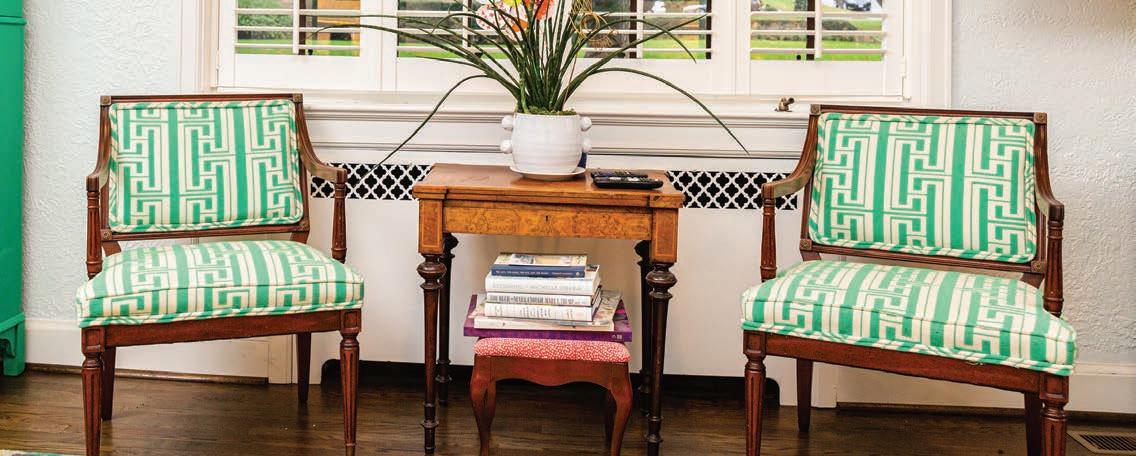
set off the vibrant artwork hanging throughout. Ginger reached out to local designer Emily Mangus, of Emily Mangus Interiors, to help her make textile choices for the new home. Since Emily helped the Avises with their furnishings at the other house, these consisted mostly of floor coverings and window treatments.
From the foyer, where a portrait of Anne Tillison painted by Adam Johnson hangs over an antique table, arches lead through to the living room. This generously sized space displays a wealth of classic Tudor charm: decorative wooden cornices above the steel casement windows and built-in shelves next to the fireplace. The colorful space is anchored by a large multicolored rug and comfortable upholstered furniture, which pick up the vibrant colors of the original art hanging around the room. Over the mantle hangs a treasured piece of commissioned artwork by Julie Hamilton: a depiction of “The Hot Fish Club” of Murrells Inlet, S.C.

Appreciating antiques
Ginger and Jack both appreciate antiques, and the home is filled with family pieces. The green secretary desk, for example, once belonged to Ginger’s parents. “I wasn’t sure how my mom would react when I asked her how she’d feel if I painted it bright jade green,” Ginger laughs, “but she was totally enthusiastic.” The desk now brightens up the entire side of the room, perfectly coordinating with the pair of federal-style chairs upholstered in a green geometric pattern. On the adjoining wall hangs a framed original blueprint of the home dated 1930.

In the dining room there are several other antiques of special significance to Ginger. The china cabinet and dining room chairs once belonged to her grandmother, and the cabinet is still home to her parents’ bone china and silver goblets. The antique sideboard is a treasured gift from close family friends and provides the perfect place to display more of Ginger’s family silver. The harlequin painted chest was found at one of Ginger’s favorite shops, The Wrinkled Egg, in Flat Rock, N.C., and the walls are adorned with local artists, notably works by Eric Fitzpatrick, Julie Hamilton, Betsy Cunningham
Morgan, Laura Trevey, Mary Boxley Bullington, Maria Osorio Driscoll, Gari Stephenson, Courtney Cronin, and Preston Mayson, most of whom are family friends. It’s hard to imagine that, nearly 100 years later, the dining room still sports its original (and functional!) chandelier and wall sconces.


Making it their own
The home still has its original staircase with turned iron balusters. Ginger and Emily Mangus chose a dove gray animal print runner to add a more contemporary touch, especially since the stairway can be seen from the front hall. Ginger selected a lantern-style light fixture to illuminate the area.


“In addition to painting, we did update most of the light fixtures in the house,” says Ginger. “It was a way to put our own mark on the home.” At the base of the stairs, next to the original telephone niche, is a small nook, the perfect size for a desk that once belonged to Jack’s grandparents. The walls are adorned with oil portraits of former pets, Reilly and Kate, Cavalier King Charles Spaniels. A doorway off this back hall leads to the eye-catching black-andwhite tiled powder room. “Emily [Mangus] impressed on us that every home needs to have a ‘jewel box,’” Ginger recalls, “and so we chose this deep turquoise gem tone to accentuate both the tiles and the Julie Hamilton painting that hangs on the wall.”
“We were so fortunate that the family we purchased from had renovated the kitchen and bathrooms,” recalls Ginger, “We literally painted the walls and moved our things in.” The kitchen, she amends, did have a darker countertop that they opted to replace with clean white quartz to match the marble subway tile backsplash.
They also added the rectangular open lantern light fixture. The effect is a welcoming, bright and sun-filled kitchen. The cabinetry is also white, a nice contrast to the dark stained hardwoods, but amazingly, past renovations and upgrades have managed to leave both an exposed brick column and a glassfronted built-in cabinet that were both original to the 1930s home. These lend a rich history to an otherwise completely updated kitchen with central island, Wolf range and large, Sub-Zero built-in double refrigerator/freezer.
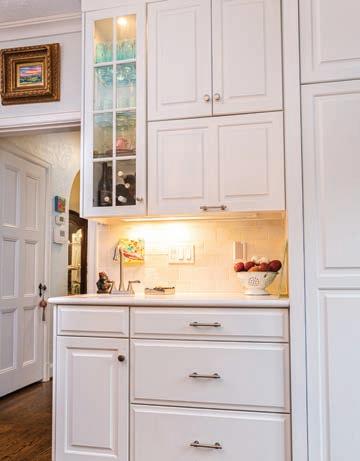


Ginger and Jack have hung many of their favorite local artists in the kitchen, so that they can be enjoyed every day. Over the stove hood hangs a whimsical oil of sheep painted by Courtney Cronin, a botanical by Carol Kaminski hangs on the end of the island, and a street scene by Betsy Cunningham Morgan adorns the brick pillar. The family enjoys cooking when time permits, and they feel that the space works well for entertaining too, thanks to the adjoining space, which was once a covered porch.

Embracing the outdoors
The “porch” was converted years ago, and the Avises have found it to be a versatile space. Furnished with comfortable upholstered furniture and a built-in bench, it’s the perfect place for a quiet cup of tea, to work on homework or for friends to hang out when the Avises entertain. In the corner, a demiluneshaped china cabinet holds a collection of Metlox pottery and Fostoria glassware that belonged to Ginger’s parents and grandmother. The coffee table began its life as a farm table that Ginger repurposed by having the legs shortened, and the side table was a Coats and Clark Spool chest (it still opens to reveal slide-out shelves that were once used by department stores to display spools of colorful thread). The chest was a treasured

wedding gift from close friends who recalled that Ginger’s father once worked for Coats and Clark. Colorful oils by Mary Boxley Bullington, Maria Osorio Driscoll and other local artists, including the resident artist Anne Tillison, enliven the painted brick walls.

Built as part of the early development of South Roanoke, the Avis home is one of only two known examples of “clinker brick” in the area. (The other one is the historic fire station a few blocks away). Clinker bricks have shape and color irregularities due to the firing process of the early 20th century, and their use adds architectural interest on the exterior of the home. The lot, which stands on a corner, guarantees that the family can enjoy the outdoors, while still feeling like they are in the center of things.

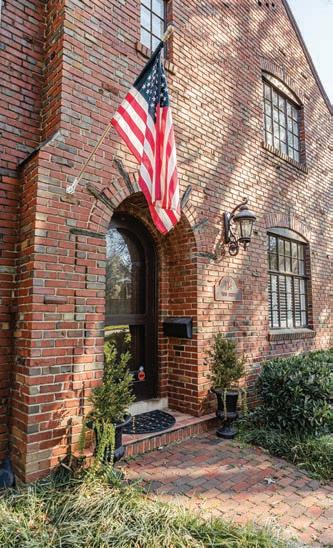
Porches, a pergola and even a hot tub lure everyone outside on nice days. The porches wrap around the house, with areas designated for al fresco dining or a relaxing evening around the fire pit. The large yard is home to a wealth of mature plantings designed to provide color throughout the growing season. Planted in shades of pink and white, azaleas, crepe myrtle, dogwood, tulips and roses bloom against the emerald lawn.

When they decided to move, Ginger and Jack were excited to move closer to the hustle and bustle of the active South Roanoke neighborhood, and the charming Tudor turned out to be just the right place. Three years later, they have put their own mark on the place, and they have goals for the future, which include updating the finished basement and perhaps adding a wine cellar. This year, they plan to open the home to visitors as part of the Garden Club of Virginia’s Historic Garden Week. (See details of the Historic Garden Tour in Roanoke on page 80.)

“We were so lucky to find a house that suits our family so well,” says Ginger with a smile, “for us, it’s the perfect fit.” ✦

ANY EXCUSE TO
Spring flavors call for celebration
 BY SARAH NICHOLAS
BY SARAH NICHOLAS
brunch
Brunch is a lifestyle. It’s not only a promise of good food, but to great company and time to unwind. I love how it's more relaxed than a dinner party but has a vibe of celebration. Here are my top three reasons to “brunch” whenever you get the chance.
1. Brunch is the best of both worlds: You can have your favorite breakfast, lunch or dinner options. It’s a no-rules menu.
2. People are happier at brunch. They got to sleep in (maybe, unless you are a parent to 6- and 8-year-olds, like myself), and they are more relaxed.
3. There is usually champagne. Need I say more?
Here are some easy, fun recipes to make brunch happen!
Spring Forward Salmon Orzo Salad

I love adding smoked salmon as a protein at brunch. It isn’t your traditional bagel and lox, which I adore, but this is amazing, too. It hits all the notes of spicy, salty, sweet and hearty yet light.
SALAD

1 ½ cups orzo, cooked
½ cucumber, chopped
1 shallot, minced


2 tablespoons red onion, chopped
1 tablespoon capers, drained
½ cup cherry tomatoes, halved
Handful of fresh arugula
8 ounces of smoked salmon, chopped
DRESSING
½ cup sour cream
1 tablespoon Dijon mustard



2 tablespoons honey
½ teaspoon olive oil
1 tablespoon lemon juice
1 teaspoon garlic powder
⅛ teaspoon cayenne
1 tablespoon chives, minced
Salt & pepper to taste
In a large bowl, prep your salad ingredients. Set aside. In another bowl, combine the dressing ingredients and whisk vigorously. Toss everything together. Salad is best cold!
Cornmeal Cakes with Strawberry Basil Compote

Hands down my favorite brunch dish! It is beautiful with its lacy appearance and tastes divine. I especially love it with the addition of rum for those adult-only brunch times!
COMPOTE
1 pound strawberries, cleaned, trimmed and hulled Handful of fresh basil, minced
2 tablespoons rum (optional) or ¼ cup water
2 tablespoons sugar
PANCAKES
1 ½ cups half & half
4 teaspoons cider vinegar
1 ½ cups fine cornmeal
¾ teaspoon baking soda
¼ teaspoon baking powder
¾ teaspoon kosher salt
2 large eggs
4 tablespoons butter, divided
Cook strawberries, basil, rum and sugar in a saucepan over medium heat. Stir continuously until strawberries are softened and syrupy, 15 minutes. Let compote cool.

Whisk half & half and vinegar in a small bowl and let it curdle slightly. Combine cornmeal, baking soda, baking powder and salt in a medium bowl. Whisk eggs into half & half mixture and slowly add to dry ingredients. Whisk to fully combine. Melt 2 teaspoons of butter in a large nonstick skillet over medium heat. Ladle ⅓ cup batter into skillet. Cook pancake until lacy and golden underneath. Flip and cook about 1 minute more. Repeat about eight times. To serve, spoon compote on top!
Spicy Strawberry Sparkle
This cocktail has a funny story: It started out being called “The Feisty Homeschooler” when my mom friends and I went to quarantine/ homeschooling mode in 2020. Now that life is much changed, I have retitled it to a more fun name that captures its sparkly vibe!
5-7 oz Champagne
1 tablespoon strawberry syrup (see note)
Dash of cayenne
Mint sprigs for garnish
Add 1 tablespoon of the syrup to a glass of champagne, no stirring, and garnish with a dash of cayenne and mint!

Note: Strawberry syrup (makes approximately 24 1-tablespoon servings)
6 strawberries
1 cup water
1 cup sugar
¼ teaspoon vanilla extract
2 sprigs of mint
Wash and core strawberries. Combine berries, water and sugar in saucepan, and bring to a boil. Stir in vanilla, and add 2 sprigs of mint. Reduce heat to a simmer, about 15 to 20 minutes until strawberries are very soft. Strain the mixture well. Allow to cool. ✦
Spring Cleaning Inspiration
Best tools and techniques
BY MARTHA COFFEYSpring cleaning, a tradition of deep cleaning when warmer weather begins, is the timehonored way to usher in a new season and tackle the toughest of household chores. While the fourth week in March is designated as National Cleaning Week, many of us prefer April to launch our cleaning sprees.
Regardless of the start date you select, be assured that the results of your efforts will produce a greater sense of well-being in your home. Research tells us that a clean, clutterfree home is likelier to be a stress-free home. Indeed, it has long been proven that clutter and disorganization lead to higher levels of the stress hormone cortisol and an increase in depressed moods: strong motivation for getting your home in order.
Cleaning professionals suggest the following tools and techniques for getting and keeping your living space sparkling.

www.bydesigninteriorsofva.com (540) 719-1431 75 Builders Pride Dr. Hardy, VA 24101 It’s 7am - Do You Know Where Your Pants & Shoes Are? Designs To Fit Your Needs & Budget FREE IN-HOME CONSULTATION Celebrating 34 Years









Start Your Day Right! 212 Apperson Drive • Salem, Virginia 24153 540.389.8570 • www closetstorage com
Assemble your supplies
Experts recommend using a caddy or bucket with a handle to hold basic cleaning supplies such as an all-purpose cleaner, a glass cleaner and a mildly abrasive cleaner. To these add plenty of microfiber cloths and a pair of rubber gloves. Keep other more specialized cleaners in the rooms where they will be used. In the kitchen, for instance, you will always need a grease-cutting liquid dish soap, and you may also need a dishwasher detergent, a stainless steel polish for appliances, an oven cleaner, scouring pads and Clorox disinfecting wipes, to name just few. Bathrooms may call for a grout cleaner, a toilet bowl cleaner and brush, a double-sided sponge, plus a Magic Eraser for easy sink, tub and shower clean-up.

Set yourself up for success by using the following products extensively tested by Consumer Reports and Best Products Review.
• Mr. Clean Clean Freak Deep Cleaning Mist (an all-purpose cleaner)
• Bar Keepers Friend (a mild abrasive cleaner)
• Sprayway Ammonia-Free Glass Cleaner
• Lysol Toilet Bowl Cleaner Gel
• Mr. Clean Magic Eraser
• Dawn Dish Soap Ultra Dishwashing Liquid
Choose your tools
• Amazon Basics Microfiber Cleaning Cloths
• Cascade Platinum
Dishwasher Pods
• Magic’s Stainless Steel Cleaner and Polish
• Weiman’s Stainless Steel
Cleaning and Polishing
Microfiber Cloth
• Easy-Off Fume Free Oven Cleaner
Professional house cleaners confirm that matching the tool to the job is critical. One of the most-used mechanized tools is the vacuum cleaner. With such a wide array of types and prices, allow Consumer Reports to help you make the best selection. Consider your living space, and then choose from the following, keeping in mind that some homeowners find it helpful to have multiple vacuums for different areas of their homes. Whatever your needs, the following have been the most highly rated for 2023.
• Best Bagged Upright: Kenmore Elite Pet Friendly 31150
• Best Bagged Canister: Miele Complete C3
• Best Corded Stick Vacuum: Shark Vertex Ultralight HZ2002
• Best Cordless Stick Vacuum: Samsung Jet 90 Complete VS20R9046T3/AA
• Best Robotic Vacuum: iRobot Roomba S9+
Plan your strategy
Work room by room and always clean from the top down. If you’re working on a big cleaning project, don’t spread yourself thin. It’s better to start and complete only a few chores in a room than to have several half-finished chores. Completing one small project at a time will help you build momentum
Break big tasks into smaller chunks. Assess what needs to be done in each room and then tackle each smaller job individually. This approach prevents feeling overwhelmed. Instead of setting an intention to vacuum an entire room, including the ceiling, the ceiling fan, the walls, the baseboards and the floor, plan to vacuum just the ceiling and fan at one time, and save the rest for another time. It’s always best to complete everything in one room before moving on to the next.
Don’t start projects you don’t have time to complete. If you have only a half an hour to spend on spring cleaning one day, be sure to select a 30-minute task. A half an hour might, for instance, be just enough time to clean out your nightstand drawers
or the junk drawer in your kitchen if that’s the room you are working in. Unfinished cleaning tasks lead to dips in motivation.
In whichever room you are working, focus on functional organizing. Functional organizing is based on the belief that the items you are organizing should be just as easy to put away as to leave out. After all, if it will take more time and effort to put items away than to leave them out, there will be no motivation to store things properly and your organizing will not reap lasting results.
Satisfaction Guaranteed
Spring cleaning doesn’t have to take an inordinate amount of time or require expensive specialized equipment; it just takes a willingness to plan and the gumption to see the tasks through to completion. And there is nothing wrong with asking for help. Even the youngest family members can do small chores. Have all who share your space help develop a checklist for spring cleaning tasks. Turn the radio up, put your earbuds in, or listen to a riveting podcast to enjoy the time spent cleaning.
Top spring cleaning tasks
Declutter first. Toss or recycle expired items, worn-out clothing, and broken toys and electronics.
Dust ceilings, light fixtures and fans with a broom or long-handled duster.

Vacuum and/or wash walls and baseboards. Rooms with less traffic may only require vacuuming, whereas others may need washing.
Wash windows and blinds.
Wash shower curtains and bathmats, as well as any other throw rugs throughout the house.
Clean outdoor furniture.
Vacuum furniture and curtains, spot cleaning and moving furniture to vacuum underneath.
Clean grout in both the kitchen and bathrooms.
Wash bedspreads and blankets and vacuum mattresses.
Deep clean the refrigerator and freezer. ✦
Let’s take this
OUTSIDE
Creative ideas for your lawn and garden
 BY AMELIA POORE
BY AMELIA POORE
We’re constantly learning new ways to create and customize the interior of our homes with tried-and-true methods for exerting creative energy in our space. This spring, consider taking that energy outside to create a garden space you’ll love all year long.
Green expectations
Before getting to work outdoors, you need to make a garden design. It might sound daunting, but the main question is how you will be using the space: Will it be a gathering place for loved ones? A work zone for your green thumb? A play space for your best four-legged friends? Or a spot for you to unwind? Based on your answer, you can more easily determine your specifications. If you are (or would like to be) a hobby gardener, consider some raised garden beds. Whether you’re cultivating flowers or growing fresh produce, raised beds have many benefits. First, they provide much more control over soil, drainage and pests than a typical plot, making them practical even in a grassless garden. Additionally, you can select any height — perfect for those of us with uncooperative joints or curious pets. And of course, a raised bed can be made of virtually any material, which ensures they’ll be just as pretty as they are functional! Add a seating area or fire pit nearby to make your hard work the true focal point of your garden.




Garden vignettes
The other key design component is size. Of course, your project does not need to address all of your outdoor space. Especially if you intend to create a more intimate space, consider focusing on a smaller area to create a “secret garden” vignette.
First, use screens to seclude one part of your garden. The “screen” can be anything, such as a brick wall, a hedge, a plant wall made from upcycled pallets or even an espalier — a fruit tree secured to a trellis, then shaped to grow flat against it. Farmers originally developed espalier to supply the most possible sunlight to every branch, thus producing more fruit sooner. Though the espalier process can take around five years to reach maturity, the end product is beautiful, unique and delicious. If you want the “wall of green” with less time and toil, consider a lattice partition or pergola with climbing plants, such as honeysuckle, climbing roses or clematis. Alternatively, pick a corner of your garden and section it off with large planters. Once you have your “secret garden” spot, all you need to do is add some seating like a bench, a few Adirondack chairs or even outdoor floor cushions.

Outdoor décor
Whether your garden is meant to be a functional or simply fun space, make sure it’s reflective of your style. Selecting plants and outdoor furniture is an easy way to accomplish this, but consider adding some uniquely “outdoor” design components: statuary and water features.


Garden art, sculptures and decorations can take your garden to the next level by centering a small garden and creating points of interest in a larger one, like a focal point in a courtyard or at the end of a path. Second, garden statues don’t need to be the dramatic statement pieces we see in public gardens, nor are
they limited to the classic deer and gnomes. Instead, pick what you like; a favorite animal or aesthetic can become a beloved garden art feature. You can choose a prominent piece, like a classical bust to bring some contrast to a group of evergreen shrubs or a pair of sitting dogs to add some personality to an entrance; or something more understated, like a small concrete rabbit climbing into a planter pot or some dragonfly-topped iron plant supports that are both practical and add interest to a flower bed or herb garden.
Another great place for garden art is around a water feature. For a naturalistic touch, add statues of animals and birds such as a concrete turtle or bronze heron that naturally drink from the pond. To add a bit more whimsy, consider a statue fountain, like a stone fish or a lion with water coming out of its mouth. If you’re looking for a simpler, quieter feature, start with a small pond or fountain and then branch out as you see fit, adding rocks, plants and koi or goldfish. If you do want to add fish, remember to add them last, since living in a construction site may disturb them.
Water features provide a unique opportunity to add water plants to your garden, such as water hyacinth, pickerel and, of course, water lilies. Adding plants at the sides of your pond or fountain is also an option and, though mosquitoes do not breed in moving water as easily, you may also want to add some mosquito repellent plants like Ceylon citronella grass, geraniums, lemon balm, lavender, marigolds, catnip, rosemary and allium. But remember, citronella, marigolds and geraniums are toxic for pets, so be sure it grows in an area your pet cannot reach.
With warm summer days ahead, now is the time to spruce up your outdoor space. Getting creative in your garden isn’t much different from getting creative inside — just make your space suit your needs and desires! ✦

Get Your Financial House in Order
HOW TO NAVIGATE AN UNCERTAIN ECONOMY
BY KATHERINE FULGHUM KNOPFThe financial markets have experienced unpredictable swings over the last two years. Grocery, utility and gas prices are escalating. Pay gains are lagging and real estate is flat. After months of negative wage growth, supply chain disruptions and rising inflation, many are frustrated and tired. Rather than despair, now is a good time to review your finances and get your house in order in case of a recession.
Where to start
Everyone should set financial goals. Taking good care of your money is a habit just like eating healthy and exercising. Review your budget, and if you do not have one, it is the time to establish one. Setting a budget and sticking to it may sound punitive, but it can be quite freeing. Sound budget techniques are simple: Write down all of your expenses then decide which are necessities and which are luxuries. Reviewing your finances periodically keeps an eye on your spending. Set realistic expenditures and cut extras. Be sure to allocate funds for savings and retirement.
Allison Link, financial advisor, RBC Wealth Management-US explains, “Managing your budget in a recessionary environment, for most people, is not drastically different than managing your budget during bull market years or strong economic environments. Living within your means and maintaining a six-month emergency savings is key in any economic environment and keeping your investments in line with long-term goals and priorities rather than trying to time the market.”

When you feel your finances tightening, look for expenses in your budget that are optional. Take-out food, specialty coffees, magazine subscriptions, phone apps and gym memberships often eat up large parts of your take-home pay. Maintain a balance — occasional splurges are good. Interestingly, data shows that the 2022 luxury market exploded despite a decline in overall retail sales. People are cutting back on specialty brands at the grocery store, shopping for hygiene necessities in bulk, and buying fewer clothes in order to indulge in one exceptional luxury item, a special evening out or a getaway. Experiences are in high demand.

Put capital you may need for living expenses or big life purchases in defensive assets such as savings accounts or CDs. You don’t want to be forced to sell your riskier assets when they are at their lows just because you need liquidity. Link suggests, “if you are sitting on excess cash but are reluctant to get it into the market just yet, consider putting the cash to work in shorter term savings options.”
Keep some “dry powder” in case the recession does materialize. Link notes, “Often times the best days in the market immediately follow or coincide with market corrections or downturns. As the saying goes, ‘It’s time in the market, not timing the market.’”
What to do in a recession


Don’t obsess over watching the returns in your investment accounts. You should check them periodically, but everyday can cause anxiety. If your investments are causing you to lose sleep, make an adjustment.
Link suggests, “You want to choose a portfolio allocation that you can stick with for the long-term, no matter what the market is doing on any given day. If you are losing sleep or experiencing disproportionate amounts of stress, your portfolio may be invested in a way that is too aggressive for your personal risk tolerance, and adjusting to a more moderate or less aggressive portfolio allocation will allow you to stay invested when times get tough. Your investments should be aligned with your long-term goals, both financial and non-financial.”

Whatever the market’s ups or downs, stick to your budget and your plan. Keep an eye on your budget to identify places you overspend. Replace expensive entertainment with low- or no-cost recreation. Be creative and find new hobbies for your free time. Look for alternative forms of enjoyment: Instead of going out to the movies, invite friends over for drinks and a game night. Pack snacks, and take the family to the park for a walk or tennis match. Challenge yourself and your friends to complete a series of hikes or learn a foreign language.
Remember, the market always wins over time. Look at long-term returns, not short-run returns. The average stock market return has been about 10 percent per year for nearly the last century, as measured by the S&P 500 index. In some years, the market returns more than that, and in other years, it returns less. Allison notes, “Bear markets do end, and the key is staying invested even in down markets with your long-term goals in mind.” ✦
RBC Wealth Management, a division of RBC Capital Markets, LLC, Member NYSE/FINRA/ SIPC.). Asset allocation and diversification do not assure a profit or protect against loss.

Historic Garden Week Get inspired!
The 2023 Roanoke tour offers a magnificent mixture of stately homes and verdant gardens. There are three houses and three gardens to see — all located in a concise loop of the South Roanoke neighborhood. Each home displays gracious living and the latest design trends in elegant vignettes.

707 CASSELL LANE
Owners: Shelby and Jason Bingham
Surprises abound in this beautiful historic home built in 1914. For Christmas 2018, it became a gift from husband Jason to wife Shelby Bingham. An experienced home renovator, she eyed the house for months before she found the deed wrapped up under the Christmas tree. She infused bright colors into dark rooms, moved walls and incorporated unique light fixtures, symmetric wall papers and patterned fabrics. The sunporch features an original lattice ceiling and a handpainted floor. Doors from several rooms lead onto a patio with fire pit and surrounding gardens. An apartment over the detached garage is perfect for grown children or guests. The covered carport and drive area are surrounded by planting areas that convey the green theme this home embraces.

2810 AVENHAM AVENUE
Owners: Diane and Tom Turner
Built in 1925, this stately brick colonial sits above a terraced lawn with manicured shrubs. Inside, the homeowners updated the kitchen in classic white with gold touches. Giving homage to its past, the homeowners kept the original griddle and wood stove and installed a brass chandelier over the island that is the gem of the room. The oak floors are original throughout the home. There are many venues for entertaining. A spacious dining room and a breakfast room with a bay window overlook a back patio with raised brick walls and a fire pit. The back patio holds a table for outdoor dining and a true chef’s grill. Large planted pots sit in nooks and beds with perennials and shrubs surround the patio space.

ROANOKE TOUR
Friday
April 21, 2023
10 a.m. to 5 p.m.
3466 WEST RIDGE ROAD
Owners: Ellen and Rudy Van Thiel
A spectacular series of sloping and terraced gardens overlook Roanoke outside this Mediterranean home. A courtyard off the dining room contains large potted mandarin orange and Meyer lemon trees. Another courtyard hosts a plunge pool surrounded by beds of gardenia, white rose and boxwoods. The Zen Garden is tucked in a side courtyard with a Japanese maple tree and a bronze sculpture. The spring garden offers azaleas, laurels, iris, native honeysuckle and witch hazel. Back terraces showcase flowering shrubs and perennials that cascade down stone walls toward a vast green lawn. A screened-in porch, deck and covered porch offer stunning views of the city. A cutting garden provides flowers for al fresco meals and seasonal arrangements.
114 26TH STREET
Owners: Ginger and Jack Avis
This 1930s Tudor-style home is one of the few remaining examples of clinker brick left in the Roanoke area. Recent renovations have preserved historic details such as steel casement windows, arched doorways and an original butler’s pantry off the kitchen. This bright and colorful family home blends old with new, boasting a large collection of local artists including Mary Bullington, Courtney Cronin and Julie Hamilton, as well as many heirloom antiques: furniture, sterling, Fostoria glassware and Metlox stoneware collections. Outside living areas include an extensive wraparound deck with space for a hot tub, al fresco dining and a pergolacovered sitting area, overlooking the back lawn. (For more details on this home, see our article on page 58.)

175 27TH STREET
Owners: Ben and Jennifer Cable

The owners describe the parklike gardens surrounding their new construction Craftsman-style home, as “cultivated wildness.”


From a stone patio with Asian-influenced pergola — complete with outdoor dining and a fire pit — to the dedicated dog run, this home demonstrates the multiple uses of outdoor living areas. Across the expanse of lawn, the homeowners have cultivated borders and foundational plantings that have year-round interest, are pollinator friendly and abundant in native plants. An arrangement of Piet-Oudolfinspired raised beds, filled with herbs, vegetables and flowers for cutting is located next to Flow Beehives imported from Australia. These hives

514 CASSELL LANE
Owner: Marcia Dent
This modern ranch-style home is approached by a stone walkway planted with mature crepe myrtles, azaleas and assorted colorful annuals. A vignette of white painted benches and planters grace the covered front porch. Inside the private fenced backyard, visitors will find a large screened-in room, complete with a dry-stacked stone fireplace that overlooks a kidney-shaped swimming pool below. The pool area boasts several outdoor seating and dining areas, whimsical sculptures and lush plantings of hydrangeas, boxwood, hosta, sedum and several ornamental grasses. ✦
FOR TICKETS AND MORE INFO, VISIT

For advertising info: (434) 845-5463 or sales@jamesrivermedia.com

Open seven days a week, The Little Gallery is a fine art gallery and consultancy that provides art sourcing, art installation and art advisory services for residential, hospitality and corporate spaces.

your next project and experience our beautiful selection of talented artists in historic Downtown Roanoke at 301 Market St. SE. You can also browse all our artist collections online at TheLittleGalleryVA.com.



